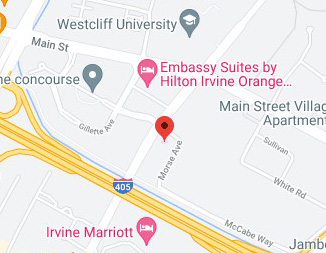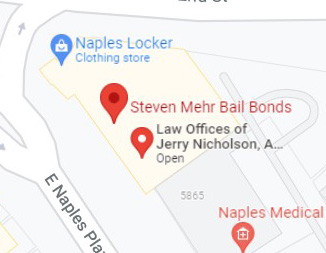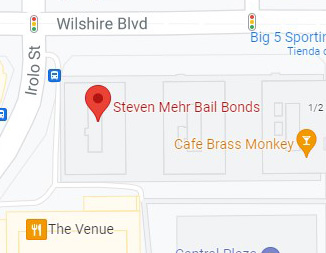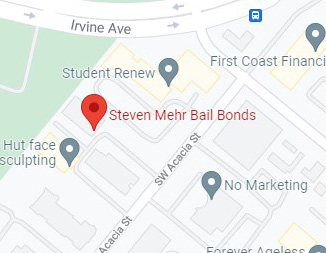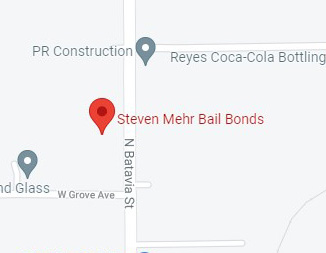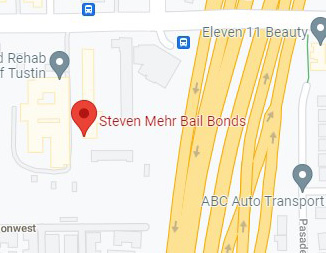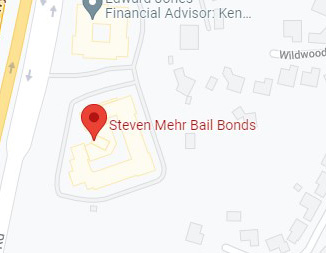Steven Mehr Bail Bonds
1938 N Batavia
Orange, CA 92865
714-535-2635
Bail bonds are an unfortunate but necessary part of modern life. They help people facing criminal charges to be released from custody and prepare their cases more adequately. If you have been arrested in Orange County, CA, and the judge has confirmed that you can post bail, call Steven Mehr Bail Bonds to help you through the process. We boast highly skilled, licensed bail bond agents who will work on securing your release within a short period. You shouldn’t have to stay in jail when you can be released and work on your case while at the same time going about your daily activities. Call us right away, and we’ll kick off the process as soon as you hang up.
Your Arrest and Booking Process
When the police suspect you of committing a criminal offense, they’ll arrest you and take you into custody. If the arrest occurred in Orange County, you would be taken to the Intake Release Center for booking before being transferred to the James A. Musick Facility in Irvine, Central Jail Complex in Santa Ana, or Theo Lacy Facility (TLF) in Orange.
Booking is an administrative process where the police gather your info and organize proof relating to the supposed offense. This process varies across jurisdictions and generally involves these steps:
- Recording of vital information— the police will take your name, contact info., information about the alleged offense, and so on.
- Mugshot— after recording your vital information, you’ll be required to sit or stand for a sequence of photographs, collectively called the mugshot.
- Fingerprints— the next step will be for the police to record your fingerprints. The fingerprints will then be kept in a database indefinitely. You may also be required to provide a hair, saliva, or any other DNA sample.
- Confiscation of personal property and clothing— after the mug shot, the police may provide you with a uniform and require you to relinquish your personal belongings and clothes. These items will be held until you’re released unless the police found anything considered proof.
- Full-body search— this is not a mere search. It requires that you remove your clothes and could be invasive. The reason behind this search is to ensure there aren’t any drugs or weapons brought in the jail or holding cell. Full-body searches are conducted even if the offense committed is minor and does not involve drugs or violence.
- Health check— you’ll undergo general health screening to ensure you neither require urgent care nor are a threat to the police or other arrestees being held. Health checks could include X-rays or blood tests.
- Check for warrant— law enforcement officers will search through the database for any outstanding warrants you may have.
- Incarceration— finally, you’ll be put in jail or a holding cell to await your trial or the judge to determine whether you can post bail. Before being incarcerated, the police may ask about factors that might cause problems in the confined space, for instance, gang affiliations.
Being Released After Booking
If you were arrested for a minor crime, you could be set free right after booking, after signing a written citation in which you promise to make court appearances at the set dates. This is known as release on your own recognizance (O.R release). But if you’re placed in a holding cell or jail, you may have to post bail to secure your release as you await your trial.
Bail is the amount of money a defendant must post with the court to be released from custody until their trial date. In Orange County, the amount of bail can be paid with cash, a property bond, or a bail bond. Courts accept cash, personal checks, traveler’s checks, cashier’s checks, and money orders. Note that bail isn’t fine. It isn’t intended as a punishment. Instead, its purpose is merely to allow the accused to stay free until found guilty of an offense and make sure they make court appearances as ordered by the court. Once all court appearances are made, including the trial, the court returns the bail amount to the defendant.
Setting Bail
Judges are in charge of setting the bail amount you’ll be required to pay. This is done during the arraignment stage of the criminal process. Every county in California has a bail schedule that guides the judge on what amount to set as bail. Click here for the Orange County bail schedule. The bail schedule specifies the amount of bail for prevalent offenses. You can often secure your release faster by depositing the amount provided in the bail schedule with the court.
And if you want to make bail but cannot raise the amount provided by the bail schedule, you can request the judge to reduce it. With the help of your lawyer, you can request to lower the bail amount in a special hearing known as the bail hearing. And note that just the way the judge has the discretion to lower your bail amount, they also have the power to raise it. When determining whether to reduce or increase the bail amount, the judge considers the following factors:
- How severe the crime is.
- Whether you allegedly threatened the victim.
- Whether anyone was injured and how severe the injury was.
- Whether you have any criminal record.
- The chance that you’ll make all court appearances.
- Whether you’re employed or have community ties such as business or property interests.
- Whether drugs and weapons were involved in your case.
- Whether you pose any threat to the public.
If you’re accused of a serious crime such as robbery, homicide, sexual assault, or kidnapping, the judge might not modify the bail amount without first determining unusual circumstances as justification. These circumstances may include:
- You’ve become seriously ill.
- Prosecution witnesses are missing or won’t cooperate.
- Discovery of proof that’s exculpatory or incriminating.
- Any changes in the specific facts surrounding the case.
- You’re discovered with a substantial amount of money and a one-way ticket to a different country or state.
The 8th Amendment to the United States Constitution provides that the bail amount not be in excess. This means bail shouldn’t be used majorly to raise funds for the Orange County government.
The judge also has the power to deny bail altogether. This may happen if you’re rearrested for committing an offense while free on bail or a different jurisdiction has a hold/arrest warrant against you. If you violated probation or parole, the judge is likely to deny bail.
Bail Conditions
If the judge grants you bail, there are various conditions you will have to comply with to guarantee a continued stay out of jail. Examples of these conditions include the requirement that you:
- Wear a Secure Continuous Remote Alcohol Monitor (SCRAM).
- Surrender your driver’s license.
- Restrict travel.
- Surrender your passport.
- Not drink and drive with any measurable alcohol amount in your bloodstream.
- Check yourself in a treatment facility.
- Wear a GPS tracking device.
- Remain under house arrest.
- Avoid contacting the victim.
If you violate any imposed conditions, the judge may revoke your bail and order that you be arrested and taken back to jail.
Posting Bail
We mentioned that there are three ways through which you can post bail, including check, property, or a bond.
Cash Bail
Cash bail is the quickest way to make bail. It’s where you deposit with the court the entire bail amount in cash or using a check. Even though it’s the fastest way of posting bail, the bail amount is usually high, making it unlikely that many individuals will raise that much cash.
If you appear in court as required, the court will give you back your bail money. However, we have cases that last one or more years, and you won’t be able to invest or use the funds whatsoever.
Also, sometimes a court won’t accept cash bail. This mostly happens if it suspects that the money comes from criminal activity, particularly if you deposit a substantial amount. For instance, if you’re accused of embezzling a large amount of cash or drug trafficking, and you deposit a bail amount of $150,000 or higher, the judge could be suspicious of the cash’s origin. It’s upon you to show that the money is from a legitimate source. Failure to which will result in the court declining to accept the money.
Bail Bond
The most common way to make bail is through securing a bond from a certified Orange County Bail Bonds company because the bail amount can be in tens or hundreds of thousands of dollars. A bail bond, also known as a surety bond, is an agreement between a licensed bail bondsman working for the bail bonds company and the defendant. Under this agreement, you promise that you will make court appearances as ordered, and in exchange, the bail bondsman promises to deposit the bail amount for you.
With this method, you’ll have to pay the bail bondsman a given premium, generally 10% of the total bail amount. This premium is non-refundable. So, for instance, if your bail amount is $50,000, you’ll need to pay the bail bondsman $5,000 for them to agree to post bail for you.
Should you fail to make all court appearances, the bail bonds company forfeits the amount of bail. Thus, the bail bonds agent has a reason to monitor your movement and ensure you appear in court. If you don’t appear, the agent will have 180 days to locate you. Apart from the premium, some bail bonds companies will also require you to provide collateral. Collateral could be a car, house, jewelry, or any valuable possession. If you miss any court date, the agent will sell the collateral to recover the bail money they forfeited.
There are two types of bail bonds in Orange County— civil bonds and criminal bonds. A criminal bail bond is the form of bond that a bail bonds agent deposits for a criminal defendant to secure their release from jail. On the other hand, a civil bail bond is a bond that an agent deposits with the court in civil cases. This bond is a form of surety that the accused will pay all the debts and any additional cost or interest if the court finds them guilty.
Property Bond
The other way of securing a release from jail on bail is by posting a property bond. Here, you give the court property worth the full bail amount in exchange for the promise that you’ll make court appearances once released. Courts require that the property’s value must be two times the amount of bail. For example, if bail is set at $50,000 and you intend to post a property bond, the property’s value should be $100,000.
The judge will accept your property bond and order your release from jail if it’s satisfied there’s sufficient equity in the property. Should you miss any court dates, the court will sell the property to recover the bail amount.
The disadvantage with a property bond is that preparing it and submitting a formal appraisal is time-consuming. Consequently, people rarely seek these kinds of bonds. But if you don’t have the money to make cash bail or hire an Orange County Bail Bonds Company, a property bond will be an alternative way to post bail.
Orange County Jail Information
Theo Lacy Facility
Orange, CA 92868, United States
Phone: 714-935-6940
The Orange County Central Complex Jail
Santa Ana, CA 92703, United States
Phone: 714-647-4666
James A. Musick Facility
Irvine, CA 92618, United States
Phone: 949-855-2600
Orange County Court Information
Santa Ana Courthouse
Santa Ana, CA 2701, United States
Lamoreaux Justice Center
Orange, CA 92868, United States
Phone: 657-622-6878
Harbor Justice Center Newport Beach
Newport Beach, CA 92660, United States
Phone: 657-622-5400
The Superior Court of California of the County of Orange
Santa Ana, CA 92701, United States
Phone: 657-622-5800
Find Reputable Orange County Bail Bonds Services Near Me
To be able to secure your release from jail as quickly as possible and most efficiently when arrested in Orange County, you will require the services of an Orange County bail bonds agent. At Steven Mehr Bail Bonds, we boast highly reputable agents when it comes to matters posting bail, who will ensure you go through the bail process smoothly and quickly. Contact us at 800-834-8522 to talk to us and secure your or your loved one’s freedom within just a few hours.





